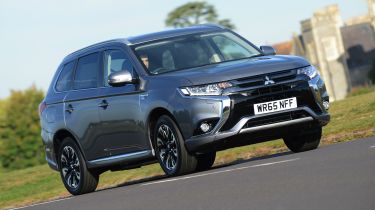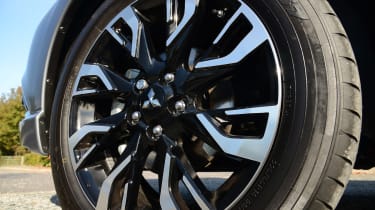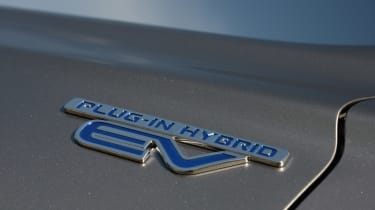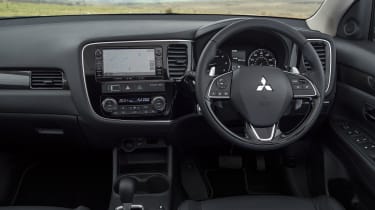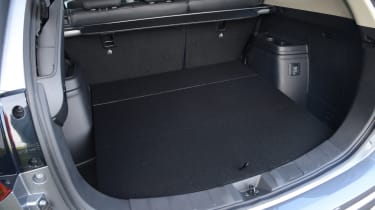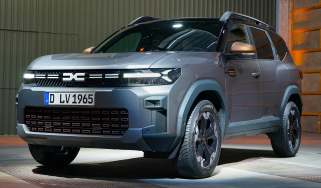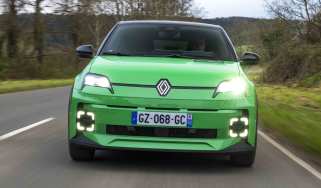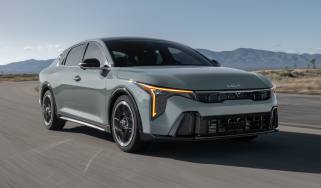Mitsubishi Outlander (2012-2021) review
The Mitsubishi Outlander will be great off-road, but it’s dynamically outdated in the class

While the Mitsubishi Outlander makes headlines thanks to the PHEV plug-in hybrid model, there are also standard petrol versions for sale in dealerships. These don't have the headline-grabbing fuel economy figures of the PHEV to talk about, but they do offer 7-seats, and their conventional powerplant will make greater financial sense for buyers who are unable to take advantage of the PHEV's electric drive.
The Outlander petrol version fits into the family SUV class, and its seven-seat layout means it's a rival for the Skoda Kodiaq, Peugeot 5008, Nissan X-Trail, Hyundai Santa Fe, Kia Sorento and Volkswagen Tiguan Allspace.
The current Outlander is the third generation, but it has a platform that can trace its roots to the Outlander Mk2 and a number of other now-discontinued models from Jeep, Chrysler, Peugeot/Citroen and even the sporty Lancer Evo. Beyond the PHEV, power comes from a 2.0-litre four-cylinder petrol unit producing 148bhp. All cars are four-wheel drive, and feature CVT auto transmission.
There are a variety of trim levels on offer. The petrol version is paired with Design and Exceed trim, while the plug-in hybrid comes with Verve, Design, Dynamic and Exceed equipment levels. Dynamic and Exceed are also available with a ‘Safety’ option pack - including various protection systems. Standard kit is generous, with all cars getting Bluetooth, a DAB radio, 2-zone climate control, rear parking sensors or reversing camera and electric heated folding mirrors.
More reviews
Car group tests
- Kia Niro Plug-in Hybrid vs Mitsubishi Outlander PHEV
- Hyundai Kona vs Mitsubishi Outlander vs Toyota C-HR
- MINI Countryman S E vs VW Golf GTE vs Mitsubishi Outlander
In-depth reviews
Road tests
Used car tests
The Mitsubishi Outlander is an oft-forgotten seven-seat SUV that rivals cars like the Skoda Kodiaq and Nissan X-Trail. Now in its third generation, the Outlander has become more popular in recent years thanks to the tax-friendly PHEV plug-in hybrid version.
The Outlander range was updated in 2015, 2017 and 2018 to keep it competitive, with new styling, extra kit and a revised chassis. Unfortunately the fast-moving SUV sector now means there are a number of rivals that are better to drive and nicer to sit in. There's even a commercial version which blanks out the rear windows and add extra load bay storage.
While the plug-in hybrid PHEV version remains a pretty unique prospect, it only makes financial sense for buyers in certain situations - business users can reap the rewards of low tax and town commuters benefit from cheap and green electric running. Mitsubishi no longer offers a diesel in the range, replacing the old 2.2-litre oil-burner with a 2.0-litre, four-cylinder petrol unit. However, we’d only recommend either if you insist that you need a Mitsubishi SUV, because there are a lot of far better rivals out there.
Engines, performance and drive
The Mitsubishi Outlander has decent enough road manners, but it's not as refined as the best SUVs. There’s still a lot of wind noise on the motorway, and although everything is much quieter and smoother with the PHEV hybrid, even that gets noisy when you demand full power.
• Best low emission green cars
Handling is predictable (but not remotely engaging) and the Outlander is generally an easy car to drive – the steering is nicely weighted and reasonably accurate and the brakes are strong.
The ride is comfortable enough, but the PHEV's significant extra kerbweight means it feels firm and unsettled over big bumps in town. Most owners are willing to accept that for the trade-off in fuel economy. Off-road, the Outlander is quite capable, with a locking centre diff boosting its ability. If you are planning to go off-road, then the petrol model should be your choice, because it comes with a 4WD lock mode for tougher terrain. In comparison, the PHEV only has 4WD because of the rear-mounted electric motor - there's no propshaft linking the front and rear axles, so you're reliant on the cars' electronics to send power to the wheels with the most grip.
Engines
The petrol engine delivers 148bhp at a rev-happy 6,000rpm and 195Nm of torque from 4,200rpm, allowing it to get from 0-62mph in a rather lacklustre 13.3 seconds and top out at 118mph, so outright performance, via the CVT gearbox, is nothing to write home about.
The PHEV is a different kettle of fish. The 2.4-litre petrol engine produces 133bhp and 211Nm of torque and helps to generate charge for the 13.8kWh battery which is located under the boot floor. This battery powers two electric motors - the front delivering 81bhp, with 94bhp at the rear. You can cruise about silently in electric mode for an estimated 28 miles, demand full power from both, or let the motor decide the optimum use of each power source. It's not fast, but it's smooth and relaxing to drive most of the time.
MPG, CO2 and Running Costs
The Mitsubishi Outlander PHEV is one of the cheapest SUVs of any size to run. Its official combined fuel consumption of 139mpg and CO2 emissions of 40g/km are only really beaten by fully electric vehicles and other plug-in hybrids.
• Mitsubishi Outlander vs SsangYong Rexton vs Renault Koleos
However, you need to take these figures with a pinch of salt. Run the PHEV on petrol power only and never charge it up and you'll struggle to often beat 30mpg, which puts it at the same level as the Outlander petrol, which has an official economy figure of 32.5mpg. The combined MPG figure is based on someone who has regular access to a charge point and whose commute allows extensive use of pure electric power.
Depreciation
Our experts calculate the Outlander PHEV will hold on to around 29 to 35 percent of its value after 36 months and 36,000 miles.
Interior, design and technology
The Mitsubishi Outlander has a smoother look than its predecessor, despite both using the same Lancer-based underpinnings. It’s been given a more curvaceous design in tune with the manufacturer’s latest 'Dynamic Shield' design language, with LED headlamps and a large ‘staging’ - as Mitsubishi calls it - of the three-diamond logo.
There’s simple chrome detailing on the grille, window line and across the rear, where there’s a neat light cluster that stretches across the tailgate. It’s not as aggressive-looking as some 4x4s, and all versions, with the exception of the Verve trim, ride on 18-inch alloys. It’s more aerodynamic, too, with underbody panels helping to aid efficiency.
On the inside, it's well screwed together but rather plain. Compared to the modern, minimalist designs of rival's interiors, the square dash and aftermarket-looking touchscreen of the Outlander isn't all that desirable. Still, there's no arguing with the quality and kit on offer.
Sat-nav, stereo and infotainment
Base Outlanders include a DAB six-speaker radio, Bluetooth and dual-zone climate control. Top models feature diamond-quilted leather seats, a heated steering wheel, touchscreen sat-nav, a 360-degree parking camera and additional USB ports in the rear cabin.. Unfortunately, the infotainment system is quite dated, with tacky graphics, fiddly menus and poor resolution. Rivals offer much better systems for similar money.
Practicality, comfort and boot space
The Mitsubishi Outlander is bigger than the previous model, with 913 litres of storage space available if you fold the third row of seats. There’s a significant 1,608 litres of load room with all five rear seats stowed flat. In petrol guise, it comes with seven seats as standard, a feature that's usually a cost option in rivals, if it's offered at all.
The rearmost seats are a little tricky to access, but the second and third rows fold easily with a one-touch mechanism. The third row is only really suitable for children, but it’s wider than before and, instead of the old car’s bench, it’s now a 50:50 split fold with individually adjustable backrests.
The boot also has additional stowage beneath the floor, and there’s a powered tailgate on top-spec models. There’s plenty of room up front, too. The plug-in version doesn’t need any additional charging equipment and can be charged through a conventional power socket.
The Outlander PHEV has a big battery pack to store in its boot so practicality suffers a little. Overall luggage space drops to 463 litres and there's no seven-seat option either.
Towing
The Mitsubishi Outlander is not class leading when it comes to towing capacity, but that being said, drivers looking to hitch up a trailer should still find the Outlander capable of most moderate tasks. The petrol is able to pull 1,600kg, while the PHEV is slightly lower at 1,500kg.
Reliability and Safety
The Outlander continues to uphold Mitsubishi’s reputation for reliability. However, the brand finished 21st in our 2019 Driver Power customer satisfaction survey, with strong scores for practicality and running costs, but let down by exterior design, a poor quality feel to interiors and sub-standard infotainment systems.
The use of high-tensile steel has made the body stiffer and there’s also plenty of standard safety equipment including seven airbags, ABS, traction control as well as the security of four-wheel drive. All this helped the Outlander achieve a full five-stars when it was tested by Euro NCAP in its stringent crash tests in 2012. The heavier PHEV version was also separately tested in 2013 and achieved full marks.
There’s also hi-tech kit available on top-spec cars, such as adaptive cruise control, lane departure warning and a forward collision mitigation system. However, the variety of beeps and bells that sound every time this kit is activated, or when you do anything, can become highly irritating - that's common with many cars of this type.
For an alternative review of the latest Mitsubishi Outlander SUV visit our sister site carbuyer.co.uk
